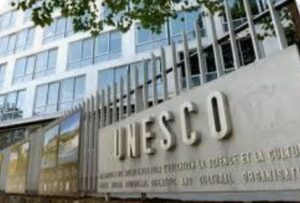Eyo Willie in his study.
As the World marks International Literacy Day Celebration 2024, a Nigerian Author and readership promotion facilitator, Eyo Willie writes on the Importance of Literacy in today’s multilingual world.
By Eyo Willie
The 8th of September every year was proclaimed International Literacy Day by United Nations Educational, Scientific and Cultural Organisation, (UNESCO), in the year 1966 to remind the International community of the importance of Literacy for individuals, communities, and societies, and the need for intensified efforts towards more literate societies.
The Theme for International Literacy Day Celebration for 2024, is “promoting multilingual education: Literacy for mutual understanding and peace.”
 UNESCO Headquarters in Paris, France
UNESCO Headquarters in Paris, France
The issue of Literacy is a key component of the UN’s 2030 sustainable development goals and the UN’s 2030 agenda for sustainable development.
The UN’S sustainable development agenda, adopted by world leaders in September 2015,
promotes universal access to quality education and learning opportunities throughout people’s lives.
Sustainable development goal 4 has one of its targets ensuring all young people achieve Literacy and numeracy and that adults, who lack these skills are given opportunity to acquire them.
The Celebration will emphasise the importance of Literacy in today’s multilingual world and its role in promoting mutual understanding, social cohesion, and peace.
Promoting multilingual education is indeed a powerful tool for fostering Literacy, mutual understanding and peace.
Multilingual education refers to teaching and learning in multiple languages, where students learn subject matter content and language skills simultaneously.
It promotes linguistics diversity, cultural awareness, and cognitive benefits.
There are several ways to promote multilingual education: This paper will be looking at it from the underlisted stand points:
Language immersion programmes: Integrate target languages into subject matter teaching.
Dual-language or bilingual programmes: Teach curriculum content in two languages.
Multilingual classrooms: Encourage students to use their home or mother tongue languages in class.
Language support services: Provide resources for language lessons, like tutoring or language clubs.
Teacher training: Equip educators with multilingual teaching methods and language skills.
Parents and community engagement: Involve families and communities in multilingual education initiative.
Language planning and policy; Develope policies supporting multilingual education at institutional at governmental levels.
Resources and materials: Develope and provide multilingual teaching resources and materials.
Assessment evaluation: Develope language sensitive assessment to accommodate diverse learners.
Promote linguistics diversity: Celebrate and value linguistics diversity in schools and communities.
By providing multilingual education, we can foster: Language preservation and revitalization; Cultural diversity and understanding; Cognitive and academic benefits; Economic opportunities and global competitiveness; Social cohesion and community engagement.
To embrace linguistics diversity, is to promote multilingual education for a more inclusive and interconnected world.
How can Literacy foster mutual understanding and peace?
To answer this question, I will like to define what Literacy is.
Literacy goes beyond the basic reading and writing skills, it encompasses a range of competencies that enable individuals to navigate and succeed in various aspects of life.
In general terms, Literacy is the ability to read, write and communicate effectively in a language, as well as to understand and interpret written and visual information.
It involves a range of skills including:
Reading: Decoding and comprehending written text.
Writing: Encoding thoughts and ideas into written form.
Speaking:Communicating effectively through verbal language.
Listening: Understanding and interpreting spoken language.
Visual Literacy; Interpreting and understanding visual information, such as images, charts and graphs.
Critical Literacy: Analysing and evaluating information to form opinions and make informed choices or decisions.
Digital Literacy: Navigating and effectively using digital technologies to access and share information.
Literacy is a fundamental skill that empowers individuals to: Access information and knowledge; Participate fully in society; Make informed choices or decisions; Connect with others and build relationships; Achieve personal and professional goals.
PEACE.
Peace is a state of harmony, stability and security, where individuals, groups and nations coexist without violence, conflict, or fear.
It encompasses:
The absence of war and violence; Presence of justice equality and human rights; Respect for diversity and inclusivity; Effect conflict resolution mechanism; Sustainable development and economic stability; Environmental sustainability; Social cohesion and community building; Psychological and emotional well-being; Freedom from fear, intimidation and oppression; Active engagement in building positive relationships and understanding.
On this note, we want to sincerely appreciate and congratulate the UNESCO’s family for their untiring unqualified efforts in sustaining the drive towards delivering the world from the clutches of illiteracy.
Eyo Willie is an Abuja based Author and readership promotion facilitator.
Share your thoughts on the story Importance Of Literacy In Today’s Multilingual World with Nigerian Kicker in the comments section.





